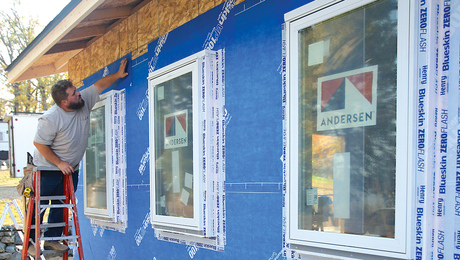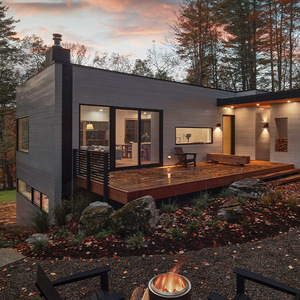*
>may I suggest you run a 4-wire or 6-wire telelphone cable from at least one unit to the entry panel in case someone wants to connect it to a central alarm system in the future
In NC, we weren’t allowed to interconnect the two. We have about 9 detectors just to satisfy the electrical inspector, and needed at least 5 more in the same places for the alarm system. Had to be totally independent systems, leading to the possibility that one would trigger and the other wouldn’t. Sounds crazy, but I checked it out with my electrician, the security co, the inspector, my insurance agent, and the fire chief, and all said same thing.



















Replies
*
Our electrician mounted all of ours high on the wall 12" down from the ceiling. The inspector liked that. They were talking about the way smoke goes up the wall before curling onto the ceiling. You don't want them right at the joint be/t wall and ceiling be/c the smoke will curl away from there. So 12-18" is high enough to get the early smoke, yet not too high to be in a dead air zone. At least that was the gist of what I overheard them discussing.
*
Walls or ceiling with distance from the opposite being called out in the installation instructions and local code. So, take your pick and have at it.
*Mad DogYou may want to check on the kind that can be connected to each other, so that if the one in the basement or first floor goes off, it will set off the upstairs alarm as well.Doing a job right now where the owner had a complete loss at 3am from a garage fire. He had a smoke detector in the garage and at the end of the hallway. Garage was insulated enough that they didn't hear it when it when off. Fire went up into the attic and only when it burned thru the ceiling of the living area did the hallway alarm go off. Fire Marshall told them that if they had been wired together, they would have be alerted sooner and that the loss might have been contained to the garage. Owner is now insisting that all alarms are wired together (that's the way we have always done them.)Vince
*Great tips, everyone. I'm going to wire a few on one circuit, and a few on another, a little insurance in cas a breaker is unknowingly tripped, and hopefully they will be effective enough.
*Mad dog,If you are going to link them all together with the third wire, they all should be on the same circuit with their own dedicated breaker. I do not know how the units would like the possibility of joining across 240 volts. Does any one here know?Frank DuVal
*Yes, Frank, the Firex units I have here warn against that. If more than one circuit is used to power the units, they MUST be on the same hot in the breaker box (at least for this brand). You should set up better insurance than using different breakers, though; -any- detectors being offline is unacceptable, as Vince's story illustrates. I like the idea of them being on the lighting circuit. An alarm that goes off if they lose power would be cool.If all the alarms go off at once, doesn't that make finding the actual problem, such as a mulfunction, annoying or worse? Might a homeowner turn the whole system off to quick-fix the annoyance and forget about it?You guys have me thinking about sprinklers again... Fire bad.
*andrew:I hope you don't want the fire alarm sound going off when the power fails, maybe just a beep. But this could run the backup battery down and eliminate the availability of the alarm if a fire should occour from the candles you are using because the power is out. This is a major cause of house fires.How about wiring emergency lights into a smoke detector circuit? Then if the power is out ( even just on that circuit) a light will be on to warn you.About all those alarms going off at once, I have 11 wired together due to the new code rules ( which does not require one in the garage here! ) so if there is an alarm, there will be a lot of running to see where the problem is. But at least I will know there is a problem and can take appropriate action, after I check all 11 detectors... Most of them are clustered near bedrooms, so a quick look can see if 7 of them are the cause. I do have a heat, not smoke, detector in the garage wired into an alarm system that automatically calls the fire department. With my cars the smoke detector would be giving false alarms... If the garage was clean enough to park the car there...Frank DuVal
*Don't misunderstand me, the insurance I mentioned was to allow a couple sets of smoke detectors to be SEPARATED, not wired together to get a 240v situation. I appreciate the warning, anyway, but I do know the difference. The idea is to have two circuits in case one gets unknowingly tripped. All of the rooms are within the same general area anyway, not separate. It is a vacation rental and the detectors are tested weekly.Thanks for the tips.
*I think what Andrew D was referring to would be a small, audible alarm akin to a wristwatch alarm. Not 100+ db like a house alarm, just something loud enough to be heard and just annoying enough. Kind of like how smoke detecors beep when the batteries get low, and it would be a seperate battery than the 'real' backup.I do like the idea of emergency lights wired in, though. And as for the problem of tracking down which individual detector has a problem, isn't it possible to wire these to an indicator panel?
*M.D. I put all of mine on the same lighting circuit, with a j-box in the attic, in case I decide to add any more in the future. The instructions do state that they be on the same breaker, or at least the same busbar. I used the firex units, which are battery backup. They have a little lite that tells you if they have 110, dead battery, etc. They also tellyou which one is tripped. I'm a firefighter and go out on a lot of these nuisance alarms, and the ones like these really make life easy on everyone. If you can simply remove the offending detector until Mr. homeowner can get a replacement in the morning ( they always seem to go off about 2 am), everybody's happy.
*Thanks wedgehead. I did buy the Firex units, cheap at Home Despot. Will be installing them next week.
*
I need to get some hardwired smoke detectors installed in a rental property to satisfy new ordinances. A battery backup may be required in the future, but for now, if any of you have experience with different systems/models and can give me any tips or links, I'd appreciate any help. Also if you have a rough idea what they might cost. Will need 6 of them.
Thanks,
Mad Dog
*MD,If you don't mind shopping at Home Depot... Brand: Fire-X.......120v no battery backup - $9.97.......120v w/ battery backup - $14.96.......120v w/ battery backup and dual sensors - $29.90Of course, your local HD may carry a different brand such as First Alert.
*MD,In my area, code requires that they all be connected. Typically I run 3 conductor romex to all, then tie the circuit to a lighting circuit so if the breaker trips, the occupants will know it and fix it.If you don't need to tie them, it'll be much easier.If I recall, they are around $10 to $20, for a ionization type with a battery backup. HD has a bunch. Actually cheaper than my wholesale electrical distributor.If it was my own house, I'd also look into the photoelectric types. I recall that these are more sensitive to smoke. SMoke may not trip the ionization type which need combustion byproducts. A slow smoldering situation might need to progress to a more significant fire before the ionization type triggers. You can mix types.Also, the garage and attic might get heat sensors.G luck,Adam
*Dual sensing units are nifty...best of both worlds. Ralph listed the Firex, First Alert also makes one, #SA301. If not going dual, then I'd put photoelectic near sleeping areas and ionization elswhere. Adam is right about the photoelectric, it gives an additional 10-15 minutes warning in a slow, smoldering fire situation. Firex also came out with #5000, an ionization unit that has some user-friendly features. Got a brochure a few weeks ago, but I "filed" it...Go with battery backup for liability...interconnecting the units so one senses and all sound also helps, and is easy if hardwiring.For rental do you need ADA compliance? Usually means a louder horn (sometimes) and a flashing strobe (always). Those add-on kits are about another $50-$60(?priced them out a year ago, may be wrong?), though someone may make an ADA-compliant unit.For the low expense ($10-30), they're worth it.Are you required to have CO detectors, too?
*I replaced mine last year (10 years, they don't last forever) with Coleman units: interconnected, 85DB horn, the one at the top of the stairs (highest point in the house) is a dual sensor with DC backup. In addition to the good advice already given, may I suggest you run a 4-wire or 6-wire telelphone cable from at least one unit to the entry panel in case someone wants to connect it to a central alarm system in the future ?
*>may I suggest you run a 4-wire or 6-wire telelphone cable from at least one unit to the entry panel in case someone wants to connect it to a central alarm system in the future In NC, we weren't allowed to interconnect the two. We have about 9 detectors just to satisfy the electrical inspector, and needed at least 5 more in the same places for the alarm system. Had to be totally independent systems, leading to the possibility that one would trigger and the other wouldn't. Sounds crazy, but I checked it out with my electrician, the security co, the inspector, my insurance agent, and the fire chief, and all said same thing.
*Here for rental properties (in town), detectors must be hardwired, interconnected, AND there must be a bell outside the house.
*I sold both hard wired and battery opp. Long life Lithium the way to go as far a battery. Hard wired here needs(I think) it's own circuit and red fire wire. A monitored system is nice if the neighbors can't hear and won't call the local FD. A combo of photo and ion is a good idea. Heat dectectors for "rough" environments help cut down on false alarms. Used to put heats in basements and laundry's. Take the humidity and dust better. A heat may be the way to go in a shop environment.
*I totally agree with Adam, Mongo, Jeff, and others who recommend using photoelectric in some areas and ionization in others. When we put on an addition several years ago we put in hard-wired photoelectric detectors in several locations. One location was in a small hallway at the top of the cellar stairs. However, this hallway was just off the kitchen and the false alarms were driving me crazy (my poor dog even more so). Finally, I changed that detector over to an ionization type and the problem was solved.
*Jeff and others:Please read the installation instructions when you select the detector battery! Some, including the one's I just installed, REQUIRE alkaline batteries. If the installation instructions say what type battery to use you should use that battery. It may sound dumb but failure to follow instructions exposes you and the occupants to risks that aren't worth it.
*I meant BUY the one's with the Lithium Batts. The ones the security system co. I sold for had a 10yr battery life. Seemed woth the extra cost. Jeff
*Thanks everyone. I'll be shopping soon.
*OK Jeff, thanks for clearing that up. Happy that you know the difference and now everyone does.
*While we're at it, does anyone have guidelines for whether the smoke detectors can be mounted high on a wall, or do they need to be on the ceiling? Would be a lot easier to wire in the walls if that's okay.